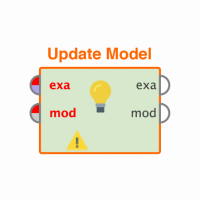A newby question here...
 University Professor
University Professor
Hello experts!
I'm a newby as well. Can anyone help me how to collect data from twitter feeds of a specific tweeter account? I would lile to get the count of dominant words in the feeds then eventually analyze if there's a pattern.
I hope you can help me out. Please experts! Godspeed.
Warm regards,
Ms. Arlene
Best Answers
-
Options
 MartinLiebig
Administrator, Moderator, Employee, RapidMiner Certified Analyst, RapidMiner Certified Expert, University Professor Posts: 3,507
MartinLiebig
Administrator, Moderator, Employee, RapidMiner Certified Analyst, RapidMiner Certified Expert, University Professor Posts: 3,507  RM Data Scientist
RM Data Scientist
Dear arlenacaballero,
i think there is no one click solution for this, because Rapidminer's Twitter operators can "only" search for keywords and do not get the history of a specific tweeter. There should be a easy way to do this with a very small script. I would guess my colleague @Thomas_Ott has something at hand?
~Martin
- Sr. Director Data Solutions, Altair RapidMiner -
Dortmund, Germany1 -
Options
 JEdward
RapidMiner Certified Analyst, RapidMiner Certified Expert, Member Posts: 578
JEdward
RapidMiner Certified Analyst, RapidMiner Certified Expert, Member Posts: 578  Unicorn
Unicorn
I think the operator you're looking for is called 'Get Twitter User Statuses'. Configure this and point it at the user you want and download their latest posts.
Be careful about Twitter's rate limit though as if you are analysing accounts that post a lot of statuses you might need to be careful on how you loop & store the since_id & max_id parameters. (You only want fresh content, not repeats)
1


Answers
Hi Sir Martin!
Thank you for your prompt response. As a newby, I feel delighted with your suggestions. I hope your collegue @Tbone could shed light on how to use the tools to finish my case study. Thank you.
By the way, may I ask how may twitter feeds can I get using the tool, or rather how can I get the older post like at least 1year. Thank again.
Thank you Sir Edward! Really appreciate your response.
Just like to ask if there's a link or online Help that could assist me to configure the 'Get Twitter Statuses'. For a newby like me, I really need a guide to figure out the solution to what I really need. Thank you.
Twitter does indeed have a rate limit and how far you can go back into the Tweet stream for their non-paying customers. For the Twitter Search API you can only get about 5,000 tweets per search term. The paid Twitter API (firehose) removes all those limits.
THe best course of action is to save your initial Twitter Search and then append the data set over time. That is typically how I do it. It does require some planning and so forth but it can be done.
This is a follow up showing a sample process that uses the Twitter Search operator. I arbitrarily assigned a positive and negative label so you can see the word frequencies and where they fall in the class labels.